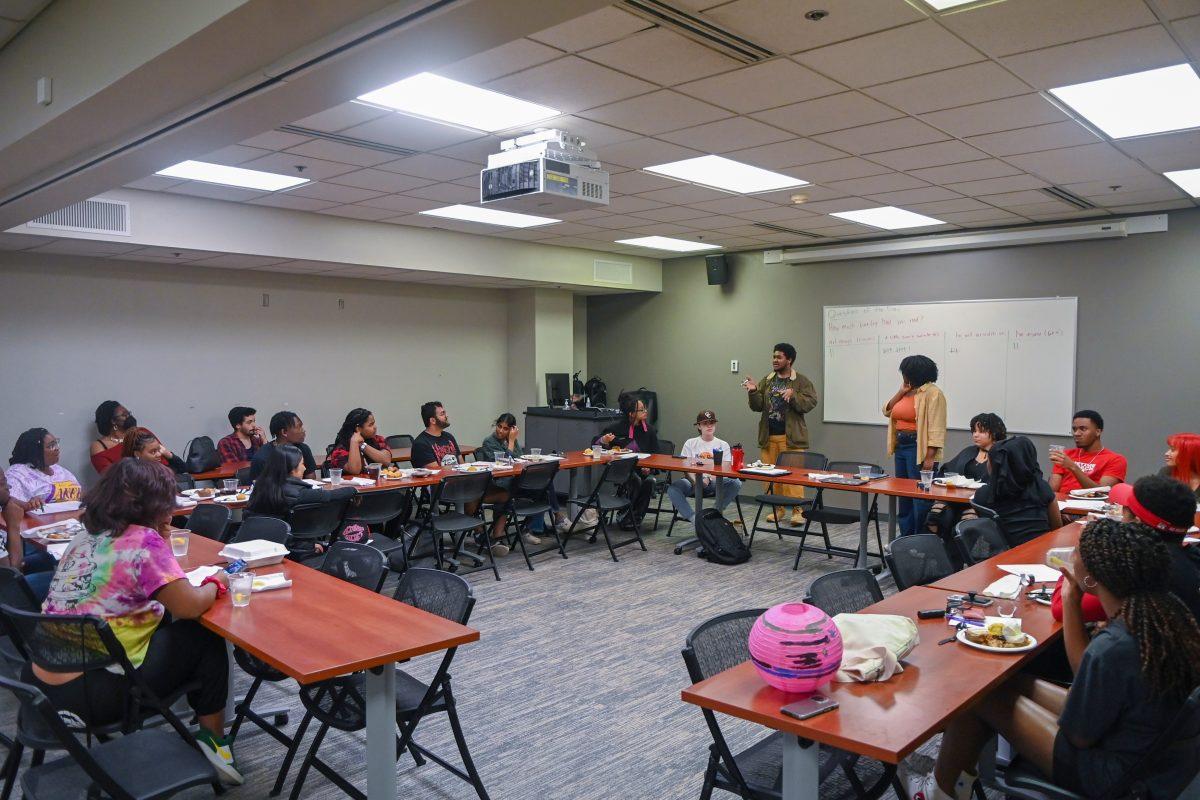In the African American Cultural Center, students gathered to eat and reflect on a selection of poetry as they relate to the theme of Black Euphoria for Black History Month.
The Chat ‘N Chew was hosted by Multicultural Student Affairs (MSA) in collaboration with the center to provide a safe and intimate space for students to refocus the Black narrative around joy in the midst of a predominantly white institution like NC State.
Gavin Bell, assistant director at MSA, discussed the measures they took to make the Chat N’ Chew a space that was not only inviting, but also comfortable enough to foster real discussion.
“If they’re eating good food, their guard is going to be down just a little bit,” Bell said. “A lot of the anxieties that we hold — food is just a nice way to release some of that. And make it like a whole environment where it can be an actual break and a rest at the end of the day, versus it just being another program.”
The food lineup included classics like macaroni and cheese, sweet potatoes and fan favorite cornbread. For the first 30 minutes, students ate, talked and listened to the music, some even getting up to line dance to Beyonce’s “Before I Let Go.”
Mya McDowell, a fourth-year studying biology, kicked off the discussion with an introduction of Black Euphoria.
“We’re always emphasizing the things that pain Black people,” McDowell said. “We see a lot of our people killed on TV, on social media — it’s everywhere, and a lot of times we don’t get to really relish the aspects that make us Black and the joys that come with that. Black joy is an act of resistance in itself because us finding joy within the pain is beautiful.”
Myasia Benson, a first-year studying biology, read aloud the first poem of the evening: “Poem No. 4” by Ijeoma Umebinyou.
For many in the room, “Poem No. 4” mimicked not only the pain that comes often in the life of Black students, but also the subsequent work of rebuilding and recentering on joy.
“A lot of times, young Black girls are conditioned to pretty much hate everything about yourself — your name, your hair, the way you speak, your body — from a young age,” Benson said. “I felt like [Poem No. 4] was repeated to emphasize how it happens over and over.
From there, the group began to discuss the common POC experience of growing up with conservative ideas on clothing and how that continues to affect people even as they get older.
“We’re always having to be strong,” Benson said. “It’s like even when we’re confident and loving ourselves it’s attacked. … If you’re comfortable in your body, if you have parents, all of a sudden people are gonna try to call you things like ‘promiscuous.’ I feel like it’s a lose-lose situation and then I just decided I’m gonna love myself regardless. I’m gonna wear what I want to wear and if people don’t like it, it doesn’t really matter.”
Sol Johnson, a fourth-year studying psychology, shared how they work to overcome that conservative parental voice that pops up when choosing what clothes to wear.
“One thing that works for me for determining whose voice is whose is listening to the second thought that you have,” Johnson said. “The first thought you have is usually like as a result of the things you’ve been taught, your implicit biases. All of those little things are not always your voice speaking so listen to the second thought that you have.”
This Black History Month, there are several opportunities to partake in Black Euphoria and recenter the narrative on Black joy. The African American Cultural Center’s website gives a great overview of what events are going on this month, including a Black State of Wellness Roundtable Discussion on Wednesday, Feb. 22.














